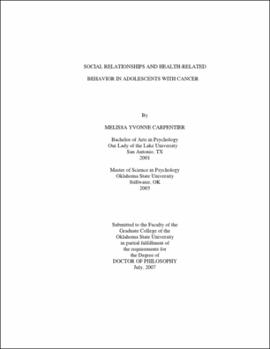| dc.contributor.advisor | Chaney, John M. | |
| dc.contributor.author | Carpentier, Melissa Yvonne | |
| dc.date.accessioned | 2013-11-26T08:27:38Z | |
| dc.date.available | 2013-11-26T08:27:38Z | |
| dc.date.issued | 2007-07 | |
| dc.identifier.uri | https://hdl.handle.net/11244/6938 | |
| dc.description.abstract | Scope and Method of Study: The purpose of the current study was to provide an examination of how dimensions of close peer and dating relationships (i.e., social support, negative interactions, dating anxiety, fear of intimacy) among adolescents with cancer correspond with ratings of quality of life, psychological distress, and health-related behaviors (i.e., tobacco, alcohol, and other drug use; sexual risk-taking; nutrition/physical activity; overweight and dietary behaviors; sun safety). Participants were 39 adolescents currently on treatment for cancer and their parents. Adolescent participants completed self-report measures of social relationships, dating anxiety, fear of intimacy, psychological distress, quality of life, and health-related behaviors, whereas parent participants completed parent-report measures of adolescent psychological distress and quality of life. | |
| dc.description.abstract | Findings and Conclusions: Results indicated that dimensions of adolescents' close peer and dating relationships were significantly related to adolescent-, but not parent-report, of quality of life and psychological distress outcomes. Significant relationships also emerged between the variables of interest and adolescent-report of engagement in current cigarette use, use of alcohol/drugs and/or birth control prior to their last sexual experience, and sedentary behavior (e.g., excessive television/computer time). With regard to prevalence rates of health-related behavior, results indicated that adolescents with cancer demonstrate lower lifetime and current rates of tobacco, alcohol, and other drug use as compared to healthy peers. In addition, only a small subset reported engaging in risky sexual behavior (e.g., multiple partners, unprotected sex, using alcohol/drugs prior to intercourse). However, a significant majority of adolescents with cancer reported engaging in sedentary behavior and suboptimal levels of fruit and vegetable consumption and sun safety. Collectively, such health behaviors are concerning given adolescents' risk for second malignancies and emphasize the need for interventions targeting health behaviors while adolescents are currently undergoing treatment. | |
| dc.format | application/pdf | |
| dc.language | en_US | |
| dc.rights | Copyright is held by the author who has granted the Oklahoma State University Library the non-exclusive right to share this material in its institutional repository. Contact Digital Library Services at lib-dls@okstate.edu or 405-744-9161 for the permission policy on the use, reproduction or distribution of this material. | |
| dc.title | Social relationships and health-related behavior in adolescents with cancer | |
| dc.contributor.committeeMember | Carlozzi, Al | |
| dc.contributor.committeeMember | Page, Melanie C. | |
| dc.contributor.committeeMember | Leffingwell, Thad R. | |
| osu.filename | Carpentier_okstate_0664D_2362.pdf | |
| osu.accesstype | Open Access | |
| dc.type.genre | Dissertation | |
| dc.type.material | Text | |
| dc.subject.keywords | adolescents | |
| dc.subject.keywords | cancer | |
| dc.subject.keywords | social relationships | |
| dc.subject.keywords | health behavior | |
| thesis.degree.discipline | Clinical Psychology | |
| thesis.degree.grantor | Oklahoma State University | |
